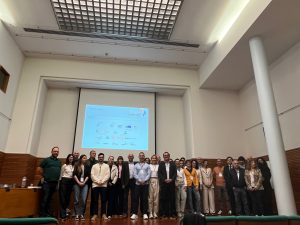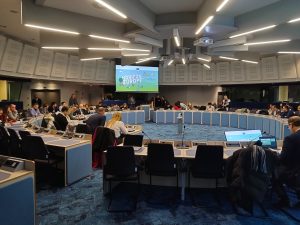Among other objectives, by 2020, an average of at least 40% of the younger generation should have tertiary education and the share of early leavers from education and training should be less than 10% (European Commission, 2010, p. 3).
But “increased investments into educational systems will not automatically increase their effectiveness and efficiency even if the quantitative targets are achieved. This is where the quality issue comes in: ‘This requires improving the quality of our education, strengthening our research performance, promoting innovation and knowledge transfer throughout the Union, making full use of information and communication technologies and ensuring that innovative ideas can be turned into new products and services that create growth, quality jobs and help address European and global societal challenges’ (European Commission, 2010, p. 9-10).
The Ministry of Education and Science of the Republic of Lithuania in order to balance the different levels of education institutions to learn (after the general and secondary schools) accession of flows, vocational education, and training system network institutions is essential to improve vocational training institutions and vocational training services image quality. Under this fact, vocational training institutions consisting the project consortium have been certified and received ISO quality management certificates.
In order to improve already existing QMS, delegates from vocational training institutes from Pavezenys region of Lithuania visited the European Center in Training for Employment – ECTE, to discuss and exchange experience about existing quality managing systems in Greece and Lithuania to ensure an integrated quality management system functioning in accordance with international quality standards of management with specific objectives to:
- strengthen the administration employees vocational training institutions, QMS working groups, responsible for the functioning of an integrated quality management system and the specific skills;
- to evaluate the quality management system efficiency indicators for measuring, on the basis of the EU partners’ experience.
The existing systems and procedures followed by the Technical University of Crete were analyzed by Professor Georgios Stavroulakis, president of quality assurance Unit and vice rector of the university. Dott. Maria Kalathaki, School Advisor for Science Teachers of Secondary Eduction in West Crete educational counselor in Sciences for the regional Directorate of Secondary education of Crete, presented the existing schemes and arguments about quality management systems in the public secondary education schools. In the private sector was referred by Mr. Theodoropoulos, Director of a private Vocation Training Institute (IEK), of Chania.
Finally, the situation in Greece, concerning accreditation and Certification ISO 9000ff, for VET was analyzed by Mr. Konstantinos Androulakis director of ECTE.
Mr. Androulakis presented the European Quality Assurance Reference Framework (EQAVET), which is a reference instrument designed to help EU countries promote and monitor the continuous improvement of their vocational education and training systems on the basis of commonly agreed references. It is a voluntary system to be used by public authorities and other bodies involved in quality assurance.


